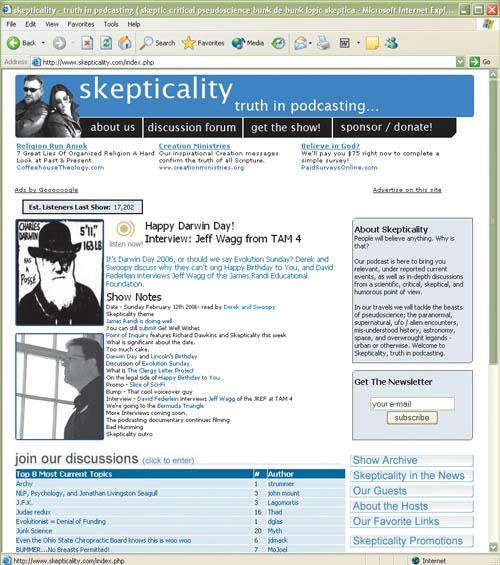A Talk with Swoopy of Skepticality
A Talk with Swoopy of "Skepticality""Skepticality" (www.skepticality.com; Figure 5.39) caters to those among us who are skeptical in naturethat is, those of us who want actual proof that UFOs exist, not just anecdotes from people who say that they've been abducted. It has the distinction of having been listed as one of Steve Jobs's favorite podcasts, so its place in the iTunes directory is secure (just kidding). Figure 5.39. "Skepticality" has the distinction of being one of Steve Jobs's favorite podcasts. Swoopy is the co-host of "Skepticality." Farkas: What was the genesis of "Skepticality"? Whose idea was it, and what were the hurdles in getting things rolling? Swoopy: "Skepticality" was all Derek's idea. In early 2005, our tiny company, Batpig Studios, was just about to begin shooting footage for an instructional DVD we were working on. Derek was doing some research on audio equipment and setups, and came across a Web site for a podcast called "The Point." He delved into the forums and began having conversations with Paul Figgiani, a fantastically talented audio engineer and producer of "The Point." That was how Derek discovered podcasting, and he began his campaign to bug me about doing one of our own until I relented. The next hurdle was to figure out what this podcasting thing was and how to go about it. We had all the equipment already; in fact, we were way ahead of the curve there. All that was left was the topic. The standard "he said, she said" format didn't interest us. What we noticed, though, was a lack of topics that we found truly interesting: the stuff that we talked about late into the night over greasy food at our favorite hangout and the stuff that caused deep discussion and often debate. Science, of course. Science, critical thinking, and the lack thereof in the world we live in. Farkas: What's the mission of "Skepticality"? Swoopy: We're striving for nothing less than total universal domination. Actually, all we want is to make people think, and more than that, for people to think for themselves and look at the world around them in a more critical way. While some of the sexy topics of skepticism, like the paranormal and all the fun that goes with that, are very entertaining, some very down-to-earth things that we deal with in day-to-day life, beg for the same kind of litmus test. Farkas: In terms of skepticism, what brought you to this position? Swoopy: Derek has been a lifelong skeptic, and that is definitely something that is a product of the environment he grew up in and the way his parents raised him. I, on the other hand, am the epitome of a late bloomer. While my worldview and Derek's have always been on fairly level ground, I am usually the first one to present the possibility that there could be another side to his classical point of view. Farkas: What was it like to be one of Steve Jobs's top podcasts? Did you feel that it validated your hard work? Swoopy: It was, and is, one of the coolest things that has ever happened and probably will ever happen. While it was a huge source of personal satisfaction, the better part was the sense that we were raising the volume of the voice that belongs to a group of people who really aren't heard loudly enough. What it really meant to us was that critical thinkingand people who love science and think that common sense and skepticism are importantwere definitely out there, and that they were listening, and we were going to be, at least in this small way, counted. Farkas: Why is podcasting important in the 21st century? Swoopy: As the mass media finds more and more ways to infiltrate our every day life (who knew we'd have to watch Coca-Cola commercials at the movies, when we're already there drinking soda anyway?), the much-lauded voice of the "everyman" gets lost. Podcasting is the ultimate way to make oneself heard. And while the mass media is spending revolting amounts of money to tell people what they should eat, listen to, and wearhow to live their lives so that they fit in (to a box no one really wants to be in anyway)podcasters in their basements are creating content for a generation of people who truly want to pick and choose their media very selectively, and they are doing it for next to nothing. Farkas: What place does video podcasting have in the podcasting realm? Swoopy: For content that is enhanced by visuals, it's definitely a cool thing. As independent film was to big studio moviemaking, I think video podcasting can be for television. It's on-demand and available on portable devices. That's exactly what people are looking for. And it's the ultimate in reality television, and we all know how popular that is. I don't think, however, that videoblogging, vlogging, or video podcasting will do anything to diminish the importance or popularity of podcasting among the audience it was originally intended for. The benefit of audio programming is that it is passive. You can listen to podcasts while doing almost any activity. Watching video requires you to be paying attention to it, and that rules out a lot of activities, like driving and such. Also, when you present your audience all the visuals, you lose the "theater of the mind" appeal that pure audio can provide. Sometimes, your own imagination is better than any video. Everyone who has had a favorite book turned into a lackluster movie knows what that's like. |
EAN: 2147483647
Pages: 89